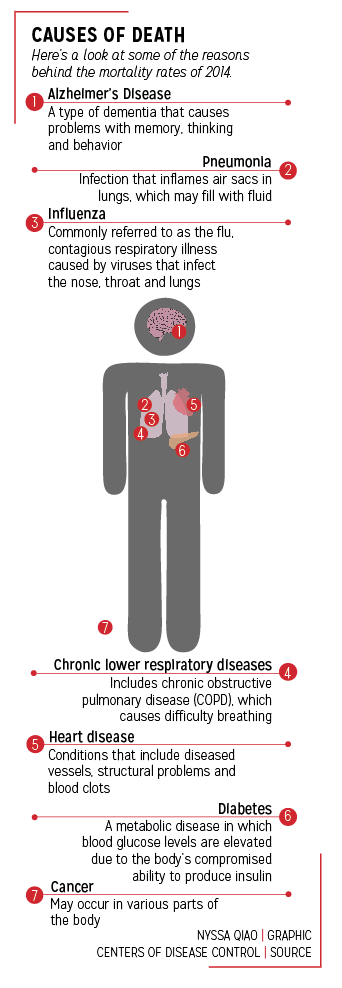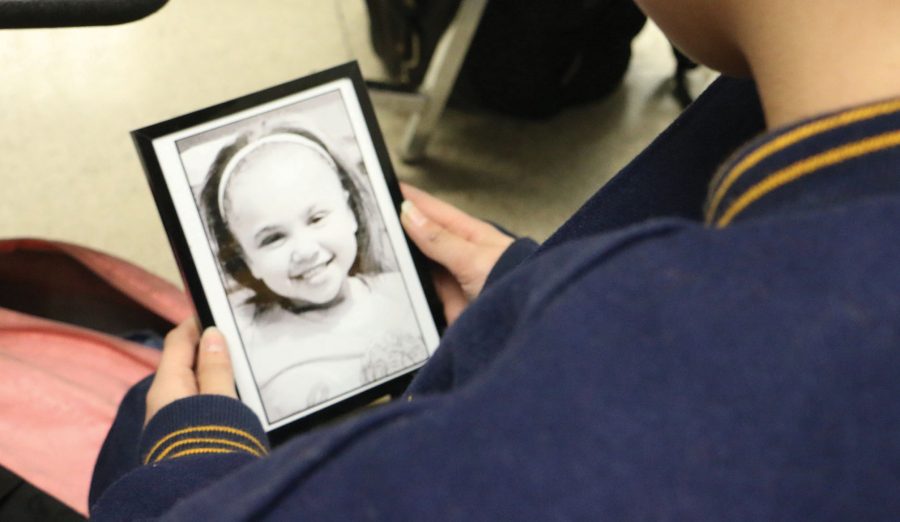Sophomore Lilah Bricker knows what it’s like to deal with grief during the holidays. Each year, Christmas is a reminder for Bricker’s family of the anniversary of her aunt’s death. In addition, Bricker recently suffered the loss of a close family friend, making this holiday season particularly painful.
“Her name was Kaleah, and her grandfather owns the lake house next to the ones my grandparents own, so I saw her a lot during the summers, every time I was up there. We played with them a lot because there weren’t many kids in the area. And we grew really close; she was definitely my favorite out of the three. We got along so well. She was playful, and bright and happy and always made me smile,” Bricker said. “She passed away from a very severe asthma attack. There was nothing that could be done; it was a huge surprise to us.”
The holidays are often considered the most joyous time of year by children and adults alike. But while many look forward to a month filled with lights, food and presents, not everyone can take part in the celebration. For those like Bricker who have experienced grief or loneliness, the holidays can often amplify the pain.
 According to student services coordinator Sara Knoop, it is not unusual for students to struggle with the grieving process during family-orientated holidays like Christmas.
According to student services coordinator Sara Knoop, it is not unusual for students to struggle with the grieving process during family-orientated holidays like Christmas.
“There’s always a good amount of people that just struggle with the holidays,” Knoop said. “Sometimes it’s just the thought of being home. Sometimes you’re home alone or spend a lot of time alone during the holidays. And sometimes that can be hard, the thought of being alone so much in the holidays.”
Knoop said reaching out to friends and family can help to alleviate the loneliness.
“My advice would be to reach out to the people that you consider your support system, whether that’s family or friends, make plans with them … try not to spend so much time on your own,” Knoop said.
Bricker said being with her family and people who understood to her loss greatly helps her during the holidays, and she said she recommends that anyone who feels any kind of grief during the holidays do the same.
“I definitely feel more lonely at some points, when I’m really missing (Kaleah and my aunt) and when I’m thinking about how they’re not going to be there, but I’m a lot less lonely when I’m with my family, and with the people who are going through the same thing as me and who can relate to me and be there for me. Having people there who can understand and support you really helps,” Bricker said.
In order to provide a support system for individuals who are grieving during the holidays, many local churches host a Blue Christmas service on the night of the winter solstice, the longest day of the year.
Via email, Rachel Ferry, representative from the Carmel United Methodist Church, said, “(Blue Christmas) is to support those who may having a hard time in the holiday season maybe because of a loss of a loved one—or just generalized sadness this time of year.”
In addition, Knoop said either maintaining holiday traditions or creating new ones are a great way to honor and remember loved ones.
“Every family has different traditions. Some it’s just whose house you go to to celebrate a meal. Others, it’s when you put up a tree or how you decorate your house. Those kinds of traditions. And sometimes, when you have a loss, those traditions can change. So, (take) time with your family to evaluate and talk about what traditions you really want to keep going, or if there’s a new tradition you want to start,” Knoop said.
As for people who have a friend or know someone who is grieving or unenthusiastic around this time of year, Bricker advises them to be careful about what they say.
 “Try and be cautious about saying certain things around that time. Like, I’m personally sensitive to things about suicide. But definitely just try and help them as much as you can,” Bricker said. “Don’t make it a continuous subject, but whenever you can sense that they’re feeling a bit worse than they usually do, or they’re off, just be like, ‘hey I’m here for you if you ever need to talk.’”
“Try and be cautious about saying certain things around that time. Like, I’m personally sensitive to things about suicide. But definitely just try and help them as much as you can,” Bricker said. “Don’t make it a continuous subject, but whenever you can sense that they’re feeling a bit worse than they usually do, or they’re off, just be like, ‘hey I’m here for you if you ever need to talk.’”
On the other hand, Knoop said people should not be afraid to ask if they sense something is wrong when they are with someone.
She said, “It’s okay sometimes if you know a friend who has a recent loss, we sometimes don’t want to ask because we’re afraid of making them sad, or afraid that we’re going to make them cry. But those are both normal things to deal with while grieving, and sometimes they want to know that somebody’s there that cares.”































![What happened to theater etiquette? [opinion]](https://hilite.org/wp-content/uploads/2025/04/Entertainment-Perspective-Cover-1200x471.jpg)














































![Review: “The Immortal Soul Salvage Yard:” A criminally underrated poetry collection [MUSE]](https://hilite.org/wp-content/uploads/2025/03/71cju6TvqmL._AC_UF10001000_QL80_.jpg)
![Review: "Dog Man" is Unapologetically Chaotic [MUSE]](https://hilite.org/wp-content/uploads/2025/03/dogman-1200x700.jpg)
![Review: "Ne Zha 2": The WeChat family reunion I didn’t know I needed [MUSE]](https://hilite.org/wp-content/uploads/2025/03/unnamed-4.png)
![Review in Print: Maripaz Villar brings a delightfully unique style to the world of WEBTOON [MUSE]](https://hilite.org/wp-content/uploads/2023/12/maripazcover-1200x960.jpg)
![Review: “The Sword of Kaigen” is a masterpiece [MUSE]](https://hilite.org/wp-content/uploads/2023/11/Screenshot-2023-11-26-201051.png)
![Review: Gateron Oil Kings, great linear switches, okay price [MUSE]](https://hilite.org/wp-content/uploads/2023/11/Screenshot-2023-11-26-200553.png)
![Review: “A Haunting in Venice” is a significant improvement from other Agatha Christie adaptations [MUSE]](https://hilite.org/wp-content/uploads/2023/11/e7ee2938a6d422669771bce6d8088521.jpg)
![Review: A Thanksgiving story from elementary school, still just as interesting [MUSE]](https://hilite.org/wp-content/uploads/2023/11/Screenshot-2023-11-26-195514-987x1200.png)
![Review: "When I Fly Towards You", cute, uplifting youth drama [MUSE]](https://hilite.org/wp-content/uploads/2023/09/When-I-Fly-Towards-You-Chinese-drama.png)
![Postcards from Muse: Hawaii Travel Diary [MUSE]](https://hilite.org/wp-content/uploads/2023/09/My-project-1-1200x1200.jpg)
![Review: "Ladybug & Cat Noir: The Movie," departure from original show [MUSE]](https://hilite.org/wp-content/uploads/2023/09/Ladybug__Cat_Noir_-_The_Movie_poster.jpg)
![Review in Print: "Hidden Love" is the cute, uplifting drama everyone needs [MUSE]](https://hilite.org/wp-content/uploads/2023/09/hiddenlovecover-e1693597208225-1030x1200.png)
![Review in Print: "Heartstopper" is the heartwarming queer romance we all need [MUSE]](https://hilite.org/wp-content/uploads/2023/08/museheartstoppercover-1200x654.png)



